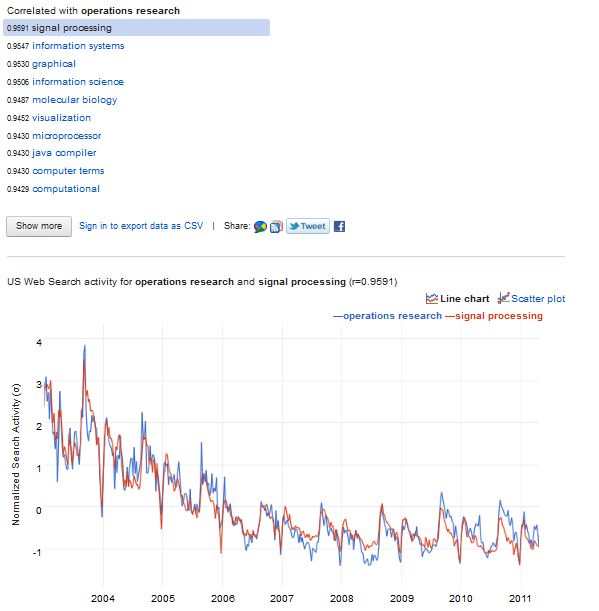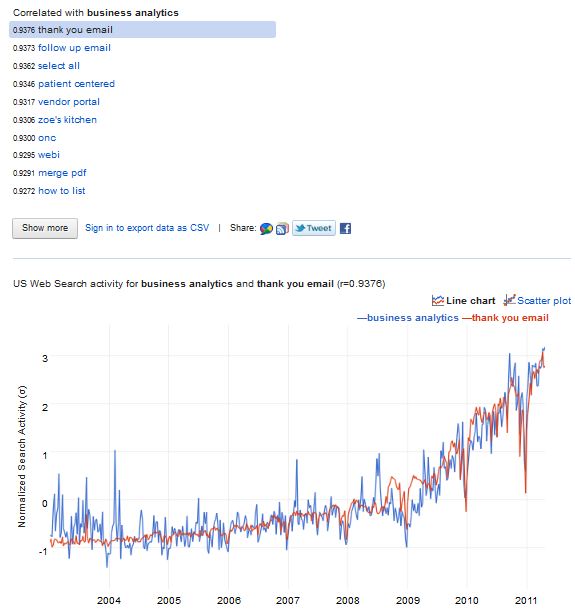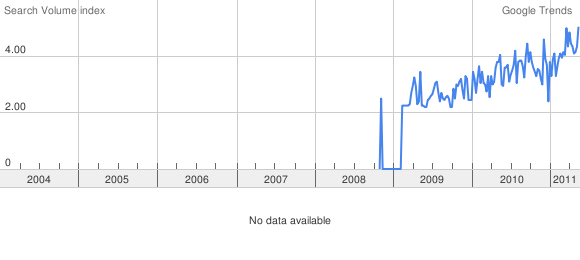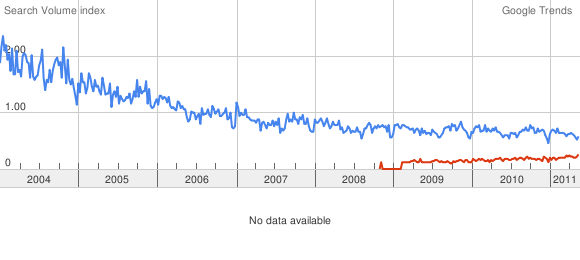In a tremendous coup for the blog, I am delighted to present this interview with Dr. Operations Research Field where she sums up the year 2010 and presents her resolutions for the upcoming year.
MT: Dr. Field …
OR: Please, call me O.R.: all my friends do, though some call me M.S. for some reason. I’ve actually had lots of names in the past.
MT: OK, O.R., thanks for seeing me. I can’t help but notice that you are …
OR: A woman? Yes, well, as an artificial personification of an abstract idea, I can appear as I choose. This year, with the INFORMS President, President-Elect, five Vice Presidents, and interim Executive Director all women, it seems most representative of the field. Not to mention women like MIT’s interim Dean of Engineering, IBM Research’s Vice President of Business Analytics and Mathematical Sciences, and my three of my favorite bloggers (Anna, Laura and Aurelie). And we all know that WORMS has the best panel discussions and receptions!
MT: Well, you are looking very healthy. There were rumors that you were dying. How do you feel?
OR: Dying? Me? Not a chance! I’m sixty years old and healthy as a horse. People have been talking about me dying for decades, and I keep outliving them all. I don’t think there is any chance of me dying anytime soon.
MT: Funny, I could have sworn you were dying. Any proof that you are actually healthy?
OR: Look at the parties I throw every year (that is “professional meetings” when discussing reimbursements with department heads). The last party I threw in Austin drew more than 4600 people! I remember ten years ago I would hold two parties a year and be lucky to get 2000 at either one of them. Any my European parties (and what parties they are!) are also breaking records every year.
MT: Wow, that is pretty amazing. Any other signs of success?
OR: Well, the Edelman Awards showed how international I got, with finalists from the U.S., Mexico, Germany, Canada, and South Africa. INDEVAL from Mexico won with a nifty way of optimally clearing trades in a financial market, meaning financial firms didn’t have to leave loads of cash lying around.
MT: That was a cool paper. What else?
OR: I love to see all the blogging, tweeting, and other things going on. OR-Exchange looks to be getting a critical mass of participants, replacing the dear departed sci.op-research.
MT: Hey, that’s not dead!
OR: It does seem to be the place to go if you want a solution manual or cheap shoes. But lots of other things are replacing it, so I think I’ll survive its loss.
MT Well, what is up for Dr. O.R. Field in the upcoming year? Have you made any New Year’s resolutions?
OR: Hey, that’s pretty clever. By bringing in the holiday, you can enter this post in INFORMS’ December Blog Challenge!
As it happens, I have made resolutions for the upcoming year. Here are a few of them
First, I resolve to embrace and define business analytics. But, as I recently read…
MT: If people write me, I’ll let you know where you read this..
OR: …Thanks… there is a tremendous risk that business analytics will be conflated with predictive analytics, like data mining, just as the line between business intelligence and descriptive analytics became very fuzzy. Business analytics has got to go beyond prediction to actual decision making, prescriptive analytics if you will, where complicated decisions are made based on the results of predictive and descriptive analytics. So the best business analytics will go beyond “Should I send this person a catalog” to “Based on these three predictive models, how should I optimally allocated my marketing budget in the face of these various constraints”. It is that level that I have the most to add. And I’d really like to be more famous!
MT: I agree! I wrote about that in the context of revenue management: you can use data mining models to provide real-time input into a hotel reservation system to provide a much more profitable and effective overbooking system. You really need to take ownership of this!
OR: I hope that the revamped INFORMS conference in the spring will really have an effect on how people think about me and business analytics.
My second resolution is to pay more attention to robustness in my models.
MT: You mean like the work of Bertsimas, Ben-Tal and many others?
OR: That is one type of robustness, but I meant something a bit broader. Let me give you an example: I was recently flying to one of my parties and had to change planes in Detroit. Now, a bunch of things have to come together in order for the flight to go. You need a plane, a pilot, a first officer, a flight attendant and so on on. Now, if the pilot is on a flight coming in from Pittsburgh, the first officer is on a flight from Montreal, the flight attendant is coming in from Des Moines, and the plane is from Albuquerque, then what is the chance that my flight is going to go?
MT: Pretty small?
OR: Right! Zilch, zero, nix, nada, zippo. There is no way that plane is going out on time, since it is delayed if even one of those multiple planes is late. This system may be optimized, but it is certainly not robust.
But if the plane and the whole crew worked together, then my flight would have been late only if one previous plane was late. This is a much more robust system.
MT: I blogged about David Ryan’s work on this years ago.
OR: Well, I guess no one reads your blog, because it is a huge issue. Imagine if the financial system was designed with robustness in mind. We might not know where the uncertainty is coming from (just like we don’t know what plane is late), but the system would better adapt to whatever weird things happen.
MT: Kinda like methods for avoiding bus bunching.
OR: You bet, but on a much larger scale.
My third resolution is to do a better job at getting the word out about me and the wonderful things I do. We’ve got a few bloggers and a magazine or two but we have to do more!
MT: Well, I’ll do my part!
OR: I hope so. I don’t want to see any more disgraces like this year when you had only one blog post in August and two in October. I almost unfriended you on Facebook for that!
MT: Sorry, I guess I better put that down as my resolution.
So, O.R. any final comments?
OR: Well, three resolutions don’t seem to be enough for me: I’d welcome any resolutions people might suggest. And may you all have an optimal New Year!
MT: Happy New Year from me too! And feel free to add your resolutions to the comments and I will be sure that O.R. sees them.




